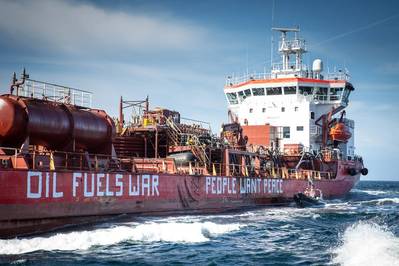Greenpeace Targets Russia-linked Baltic Sea Fuel Tanker
Greenpeace activists painted slogans on an Estonian-owned tanker in the middle of the Baltic Sea on Friday, and said the ship supplied bunker fuel to vessels transporting Russian oil that posed a danger to the environment and would fuel conflict.
"Oil fuels war," the campaigners, who arrived in small boats, scrawled in large white letters on the side of the Zircone tanker, pictures provided by Greenpeace showed.
The vessel, sitting in international waters off the Swedish island of Gotland, has supplied fuel to more than 50 oil tankers travelling to or from Russian ports in the last two months, Swedish public broadcaster SVT reported this week.
Greenpeace said it was concerned that any accident or spill from the Cyprus-registered tanker could cause an environmental disaster in the fragile Baltic Sea ecosystem.
The Zircone is part of a fleet operated by Fast Bunkering, which in turn is owned by Estonia-registered Baltic Sea Bunkering OU, Latvian and Estonian company registers show.
Fast Bunkering said it provides services only to vessels owned by European companies and that it complies with all applicable sanctions and restrictions.
A shadow, or grey fleet of ships continues to operate in international waters, transporting oil from Russia, Iran and other sanctioned countries despite certification providers and engine makers no longer vouching for their seaworthiness.
Greenpeace said in a statement that the Zircone had for months "sold fuel to the shadow fleet", a claim the company denies.
"I can assure you that these statements are not true, and we do not bunker the so-called grey fleet," Fast Bunkering CEO Alexey Volkov said in a statement to Reuters.
Western sanctions imposed following Russia's invasion of Ukraine do not ban the provision of marine fuel, which the tankers use to power their own engines as they transport oil to customers.
"We do not use marine fuel of Russian origin; most of the marine fuels we use are of European origin," Volkov said.
(Reuters - Reporting by Ilze Filks, Nerijus Adomaitis and Andrius Sytas, Editing by Terje Solsvik and Ros Russell)














